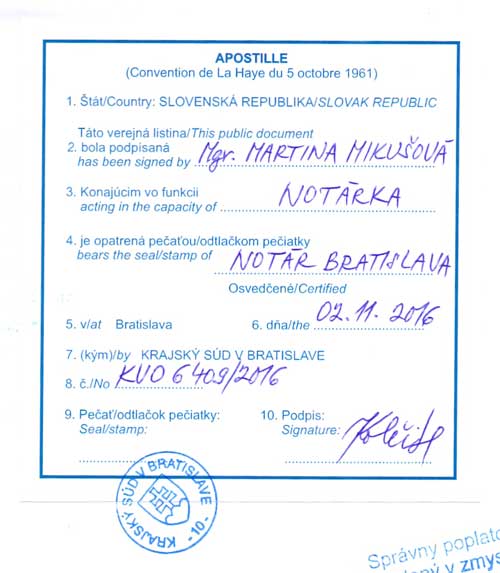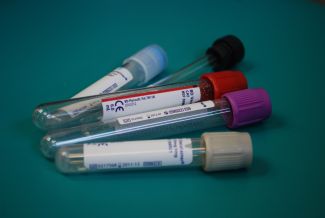
Schmidt & Schmidt covers the full spectrum of legalization services for documents issued in Slovakia.
Slovakia joined the Hague Convention on the Simplified Authentication of Documents on 6 June 2001; the Convention entered into force on 18 February 2002.
The apostille, or the “Hague apostille” is a certificate that authenticates the origin of a public document (e.g., a birth, marriage or death certificate, a judgment, an extract of a register or a notarial attestation). It confirms the authenticity of the signature and the authority of an official who signed the public document.
Documents issued in Slovakia are certified with an apostille in accordance with the Hague Convention of 1961 are recognized in all Member States of the Hague Convention and do not require any other form of certification, such as consular legalization, which considerably reduces the costs and time required for the certification of documents. So far, more than 120 states have joined the Convention.
The apostille is not sufficient for use in the states that are not party to the Hague Convention. In this case, consular legalization applies to a public document.
Designated Competent Apostille Authorities in Slovakia
In Slovakia, the designated Competent Authorities for issuing apostilles are as follows:
- All Regional Courts ("Krajský súd") are authorized for: a) Public documents issued or certified by District Courts, notaries, or huissiers de justice within their territorial jurisdiction. b) Translations executed by official (court-appointed) translators or opinions issued by official experts.
- The Ministry of Justice of the Slovak Republic ("Ministerstvo spravodlivosti Slovenskej republiky") handles documents emanating from judicial authorities other than those specified in point 1 above (documents from courts other than District Courts).
- The Ministry of Interior of the Slovak Republic ("Ministerstvo vnútra Slovenskej republiky") deals with public documents emanating from authorities within its jurisdiction, except for documents specified.
- The Ministry of Education of the Slovak Republic ("Ministerstvo školstva Slovenskej republiky") is responsible for public documents emanating from authorities within its jurisdiction.
- The Ministry of Health of the Slovak Republic ("Ministerstvo zdravotníctva Slovenskej republiky") handles public documents issued by authorities under its jurisdiction.
- The Ministry of Defence of the Slovak Republic ("Ministerstvo obrany Slovenskej republiky") is in charge of public documents emanating from authorities within its jurisdiction.
- The District Office ("obvodný úrad") handles: a. Extracts from registers of births, deaths, and marriages ("matrika"), except for decisions concerning civil status. b. Documents issued by autonomous local authorities.
- The Ministry of Foreign Affairs of the Slovak Republic ("Ministerstvo zahraničných vecí Slovenskej republiky") deals with any other public document issued in Slovakia not specified above.
The apostille in Slovakia is a square stamp in Slovak and English with the obligatory heading "Apostille" and a reference to the 1961 Hague Convention in French (Convention de La Haye du 5 octobre 1961). The apostille certificate’s sides will be at least 9 centimeters long.
Types of documents

| Can be apostillized | Cannot be apostillized |
|---|---|
|
|
Specific aspects and document requirements for the apostille in Slovakia
Slovakia is among the 120 countries that recognize and issue apostilles in accordance with the Hague Convention of 5 October 1961. The apostille serves as a confirmation of the official status of a document.
The apostille process can vary depending on the sender and recipient country, but typically to obtain an apostille for a document in Slovakia, you must go through the following steps:
- Obtaining the original document to be apostilled;
- Verification of the signature on the document by the authorized body;
- Issuance of an apostille on a document by an authorized body;
- Submission of the document together with the apostille in the recipient country.
This process can be time-consuming, especially if it includes multiple documents and different countries. To ensure a smooth and accurate apostille process, it is recommended to seek guidance from specialists familiar with the requirements and procedures. Their expertise can help avoid delays and errors in obtaining documents apostille.
Document requirements that might apply:
- The document must be an original or a certified copy issued by the competent authority.
- The document should contain all relevant and accurate information.
- The document must be in the official language of the issuing country or translated into the official language of the country where the apostille is sought.
- The apostille must be affixed by the designated competent authority in accordance with regulations.
The apostille is issued in a uniform format. In Slovakia, it has the form of a printed sticker with a handwritten signature of an official, an official seal, and a hologram.
In cases where apostilles are not recognized, holders of foreign documents will need to legalize them instead. However, If the country of destination of the document recognizes and issues apostilles, then legalization is unnecessary.
Legalization of Slovak educational documents for use abroad
For documents issued and signed by public officials within the Slovak Republic, including those issued under the seal of the Slovak Republic or by schools forming part of the Slovak school system, the following process of apostille or will usually superlegalization apply.
The application can be submitted by post or in person at the filing room of the Ministry of Education, Science, Research, and Sport - your application will not be checked upon submission. Any delays caused by incorrect or incomplete submissions are the responsibility of the applicant.
The process, as mandated by law, generally takes no longer than 30 days. If you opt for personal pickup, provide your phone number and email address in the application form. To initiate the application, prepare the following:
- A completed application form indicating the country where the apostille or legalization is required and your contact details.
- The original document with the hand-written signature of the relevant public official (rector, vice-rector, dean, vice-dean, school director, deputy school director) and the official (round) stamp.
- An administrative fee of 10 EUR per document. This fee remains constant regardless of the number of pages, provided they are securely bound or sealed together. (Please note that the fee cannot be paid at the Ministry; refer to the provided payment options.)
Regulation on public documents (EU) 2016/1191 of 6 July 2016
Furthermore, Regulation (EU) 2016/1191 of 6 July 2016 on public documents simplifies the circulation of certain public documents that must be presented in an EU Member State and have been issued in another EU Member State, thus exempting public documents from the confirmation of authenticity with the Apostille with the aim of reducing administrative burden and costs for citizens.
Consular legalization of Slovak documents for use abroad
Consular legalization is the process of authenticating or certifying a legal document so a foreign country's legal system will recognize it as with full legal effect that is carried out by the diplomatic or consular mission of the country in which the document is to be used.
Consular legalization is more complex, time-consuming and costly than the simpler apostille procedure. Whereas apostille is usually issued within one step, consular legalization requires several pre-certifications before a public document can be certified at the embassy or consulate of the destination country.
It is a common requirement that the document has to be translated into the official language of the destination country before submission to the embassy. It is up to the diplomatic mission to decide about the authentication procedure.
The main differences between an apostille and consular legalization of documents
The common feature between apostille and consular legalization is that they authenticate an official document for presentation to institutions in another country. However, they have many differences.
| Apostille | Consular legalization | |
|---|---|---|
| Legal effect | Can be used in all countries that are party to the Hague Convention on the Simplified Legalization of Documents. | Use between States one or both of which is not a member of the Hague Convention, or where one of the contracting States has protested the accession of the other. |
| Difficulty | Moderate. To obtain an apostille, contact the competent apostille authority of the state of origin of the document. | High. For consular legalization, various inland authorities and a diplomatic mission of the state of destination must be involved. |
| Pre-certification | Usually not required. | Is obligatory. |
| Attestation at the state of destination embassy in the state of origin of the document | No need to contact the Consulate of the country of destination. | Is the final step of legalization. |
Apostille and consular legalization in all cities of Slovakia
Schmidt & Schmidt provides apostille and consular legalization services for public documents originating from all regions across Slovakia. We handle the entire process, from document review to obtaining the necessary certifications, ensuring that your documents are valid and recognized internationally. With our reliable services, you can confidently use your Slovak public documents abroad.
Procurement of documents from Slovakia
If the important documents are lost or damaged, or current copies of the documents are needed, the re-issue of the documents is required. It is not unusual for people outside Slovakia to encounter difficulties with obtaining new documents when abroad. Our consultants will help you procure new documents from Slovakia remotely, and we can arrange for your documents to be sent by courier anywhere in the world.
Certified translation of documents from Slovakia
Copies and transcripts of civil status documents can be translated into any language by a sworn translator in Slovakia or the translation can be done in the country of destination. We offer certified translations of civil status documents with further certification. The cost of the work is calculated according to the volume of the document in question.
Does the translation have to be apostillized?
Any foreign document issued in one country and used in another country must be legalized for use abroad. Therefore, the authenticity of a certified translation from Slovakia needs to be certified by an apostille. Consequently, many authorities may not accept certified translations from Slovakia if the translation has not been properly authenticated in Slovakia for use abroad. To avoid this confusion, translations should better be made in the state of the destination of the document.

























































